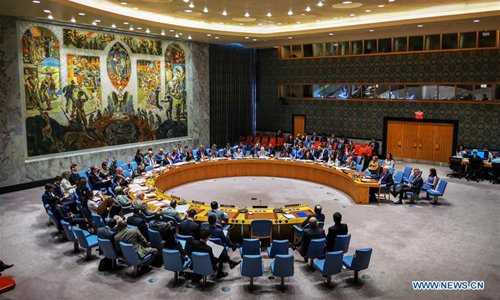HOME >> WORLD
Iran urges Europe to save 2015 nuke deal from collapse
Source:Xinhua Published: 2019/12/24 10:35:39

Photo taken on June 26, 2019 shows the United Nations Security Council's semi-annual briefing on the implementation of Resolution 2231, which endorsed the Joint Comprehensive Plan of Action (JCPOA) on Iran's nuclear program, at the UN headquarters in New York. Joao Vale de Almeida, head of the EU delegation to the United Nations, on Wednesday reiterated support for the Joint Comprehensive Plan of Action, commonly known as the Iran nuclear deal, despite mounting tensions between the United States and the Islamic republic. (Photo: Xinhua)
The Iranian government on Monday urged the European parties to the 2015 international nuclear deal to protect the accord from collapse.
Iran can be dissuaded from further reducing its nuclear commitments if the Europeans remain fully committed to their obligations, Ali Rabiee, spokesman of the Iranian government, was quoted as saying by the state TV.
Iran has been critical of France, Britain and Germany for what it calls their "failure" in protecting Iran's economic interests under the deal, known as the Joint Comprehensive Plan of Action (JCPOA), after the United States left the accord last year and re-imposed sanctions against the Islamic republic.
The three European countries developed a payment channel mechanism, known as the Instrument in Support of Trade Exchanges (INSTEX), with the aim to enable companies in Iran and Europe to maintain trade while skirting the U.S. anti-Iran sanctions. However, Iran says the Europeans have failed to implement it.
Meanwhile, the Europeans also threatened to trigger a mechanism to return all international sanctions against Iran which has gradually dropped its nuclear commitments following the U.S. unilateral exit from the accord last year.
Earlier in the day, Ali Akbar Salehi, head of Atomic Energy Organization of Iran, warned that it would be "detrimental" to the JCPOA if the Europeans trigger the mechanism to return all sanctions against Iran.
"The Europeans want to preserve the nuclear deal as it is of security importance to them," Salehi said at the launching ceremony for a secondary circuit of Iran's Arak heavy water plant.
But "if they reactivate the mechanism, nothing will remain from the JCPOA," he was quoted as saying by official IRNA news agency.
In response to the U.S. withdrawal from the JCPOA and its subsequent re-imposition of sanctions as well as the Europeans' sluggishness in facilitating Iran's banking transactions and oil exports, the Islamic republic has moved to drop its commitments to the JCPOA.
Besides the latest move to begin enrichment activities in underground Fordow nuclear facility, Iran has started to build stockpiles of nuclear fuel and enrich low-grade uranium to a higher level of purity.
On Sunday, Ali Shamkhani, secretary of Iran's Supreme National Security Council warned that Iran would take the fifth step of scaling back its commitments under the 2015 nuclear deal.
Posted in: MID-EAST,WORLD FOCUS